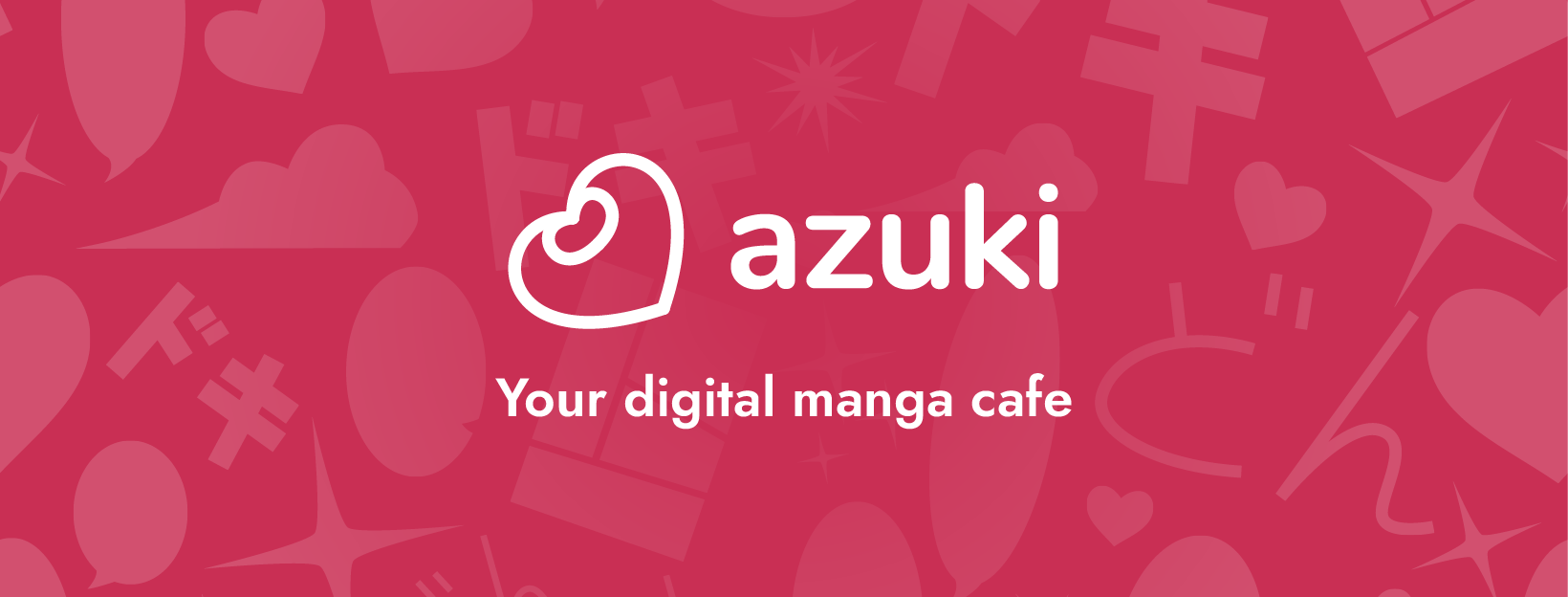This is part two in our series of deep dives of the various English digital manga platforms that are available today. You can read part 1 about Manga UP! here.
Azuki is a web, iOS, and Android manga platform available in all regions outside Japan that carries many manga (currently over 370 different series) published by a variety of different publishers. At launch in 2021, Azuki partnered with Kodansha USA to bring a huge chunk of their digital catalog to the platform, and almost immediately after that they announced that manga from Kaiten Books would also be available. Azuki has since partnered with several more publishers like J-Novel Club and has even licensed a few series of its own.
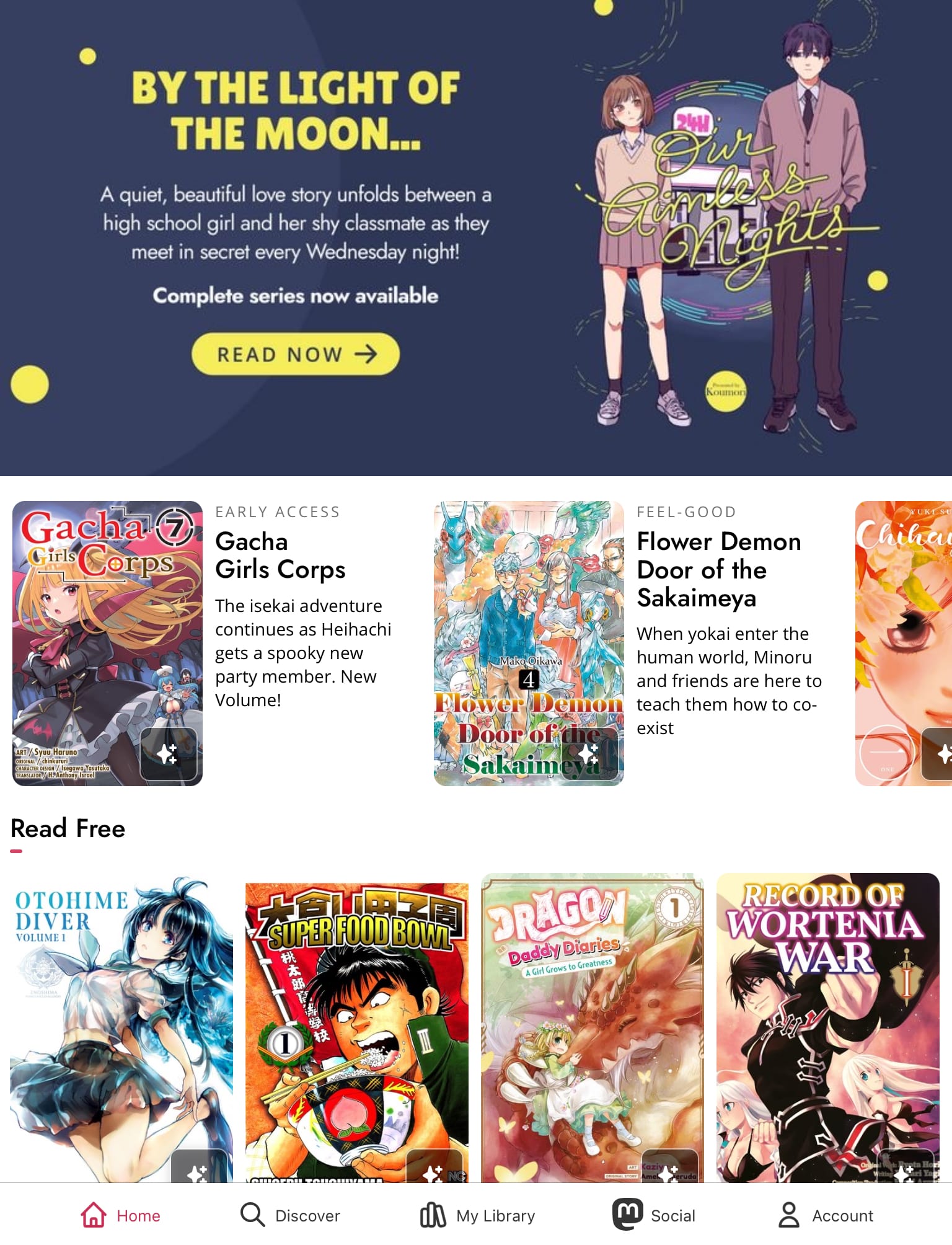
When you log into Azuki, you're greeted with a banner for the latest series they're promoting (today it happens to be Our Aimless Nights) and below it there are a number of rows of series à la Netflix or Crunchyroll to help you discover something new or continue reading something you've already started. By tapping Discover, you can see a list of every series that's available on the site. In the app, you can filter by genre, publisher, and whether or not the series is fully available with a subscription, while the website doesn't let you filter by publisher. In either case, the series list will be sorted by popularity by default, with the option to sort by title or by the date a series was added to the service. If you go to a series on the website, you can see its publisher and from there it links to all the series from that publisher, but that link is not present in the app. Next to Discover on the app is My Library, which contains tabs for My List and Downloads, and next to that is the Social tab, which has a feed from Azuki's Mastodon. Finally, there's the Account tab for basic account management, adding funds to your wallet, and a few links to useful resources that are only on the website.
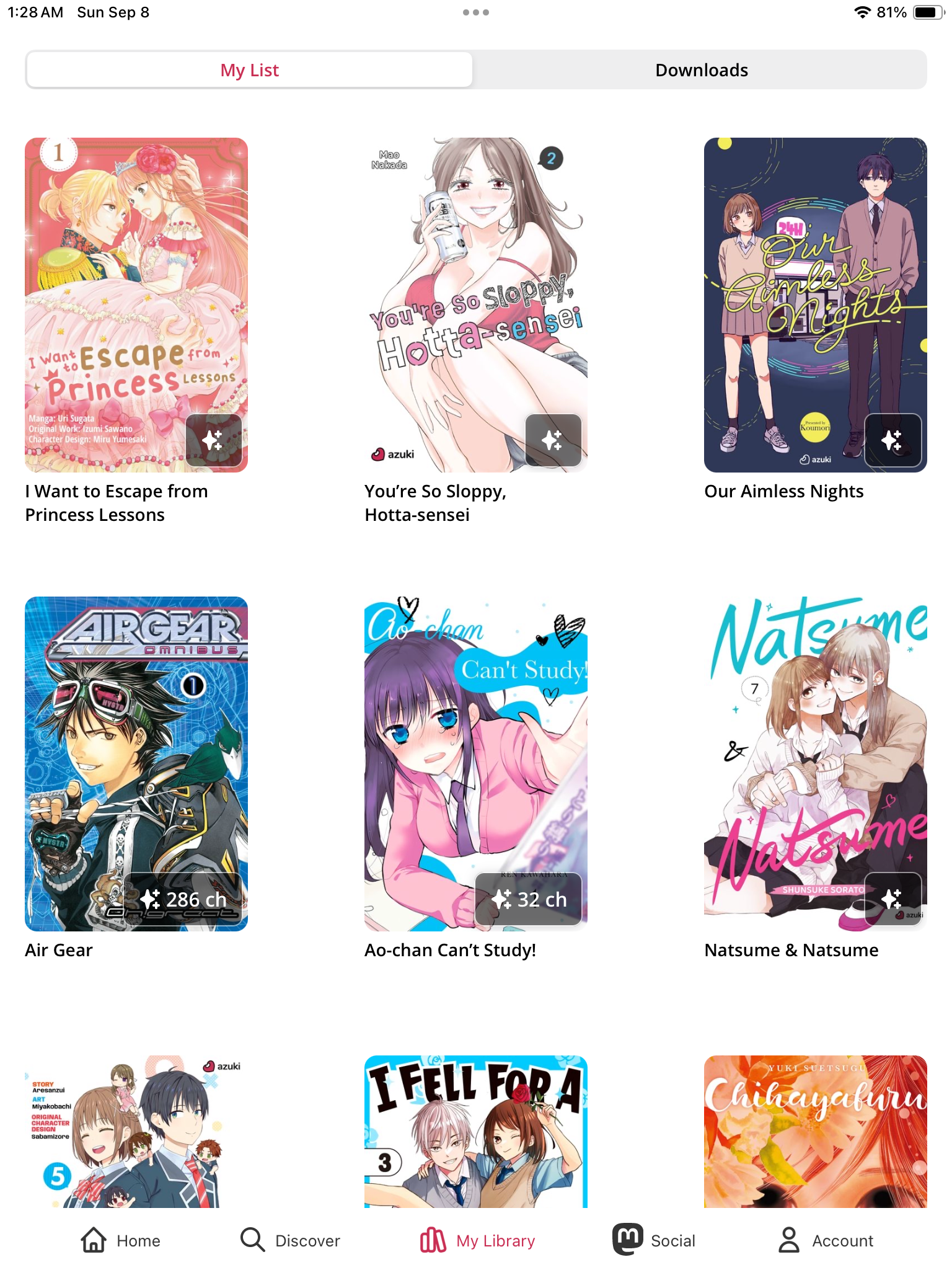
Adding a series to your list does two things: it adds the series to the various "My List" sections on the webpage and app and it starts sending you notifications for new chapters. The notifications come via the app as well as through email, but there doesn't appear to be any way to turn off notification emails without also turning off all marketing emails. This would be a welcome feature, but it's far from a deal breaker.
(Mostly) No nonsense pricing
One of the strongest points in favor of Azuki is its pricing model. For $4.99/month (with a two-week free trial), your premium membership gets you unlimited access to the catalog, save for the series published by Kodansha. For those, some number of chapters of each series—ranging from a few to a few hundred—are available as part of the subscription, and the rest are available to purchase as individual volumes. These volumes aren't exclusive to Kodansha series, with a single volume starting at $8.99, but all volumes have a 20% discount if you have a premium membership. Buying a volume unlocks all of its chapters to read in the Azuki reader, and for some series the purchase comes with a DRM-free ePub edition. The only way to consistently tell whether a series gives you an ePub or not is to read the banner on the series page, but as a rule of thumb, if the series is licensed by Kodansha, then it won't have an ePub edition. It's worth noting that when I tested out the ePub purchasing last year, "The Yakuza's Guide to Babysitting" volume 1 had the title "Yakuza01_Digital(epub)" embedded in it, but a more recent purchase was much better formatted. The download links are sent via email and expire after 30 days, so don't forget to actually download them. Otherwise, you'll have to contact support. Digital volumes from any publisher can be purchased on the website, but only volumes of Kodansha series with chapters excluded from the subscription can be purchased in app using funds added to your wallet.

The story gets a bit more complicated if you don't want to pay, but it all stays pretty reasonable. Most series have at least one chapter, but often several, at the start that can be read for free with a fairly unobtrusive preroll ad and typically one midroll ad per chapter. The last time I tested this, no actual ads loaded, so I don't have the best idea of how intrusive they can get, but as of right now the experience isn't bad at all. A smaller number of series also have more recent chapters available to read for free. However, if you sign up for a free account, you can unlock an additional chapter per series per day through a feature they're calling "chapter passes." When used, a chapter pass gives you 24-hour access to a chapter after which you get a chapter pass back to use again. The 24-hour timer is separate for each series, and it starts when you use the pass, so you can't, for example, read two chapters back to back at midnight. The most notable exceptions to this are the series published by Kodansha, which currently don't support chapter passes. Like I mentioned above, purchasing a volume will unlock all its chapters for reading in the Azuki reader, even for chapters that are included in the premium subscription. That means you can cancel your subscription and retain access to the chapters in the volumes you bought. I can't imagine purchasing individual volumes is a very popular way of reading most manga on the site, though, since a single volume costs nearly double a month's subscription.
The reading experience
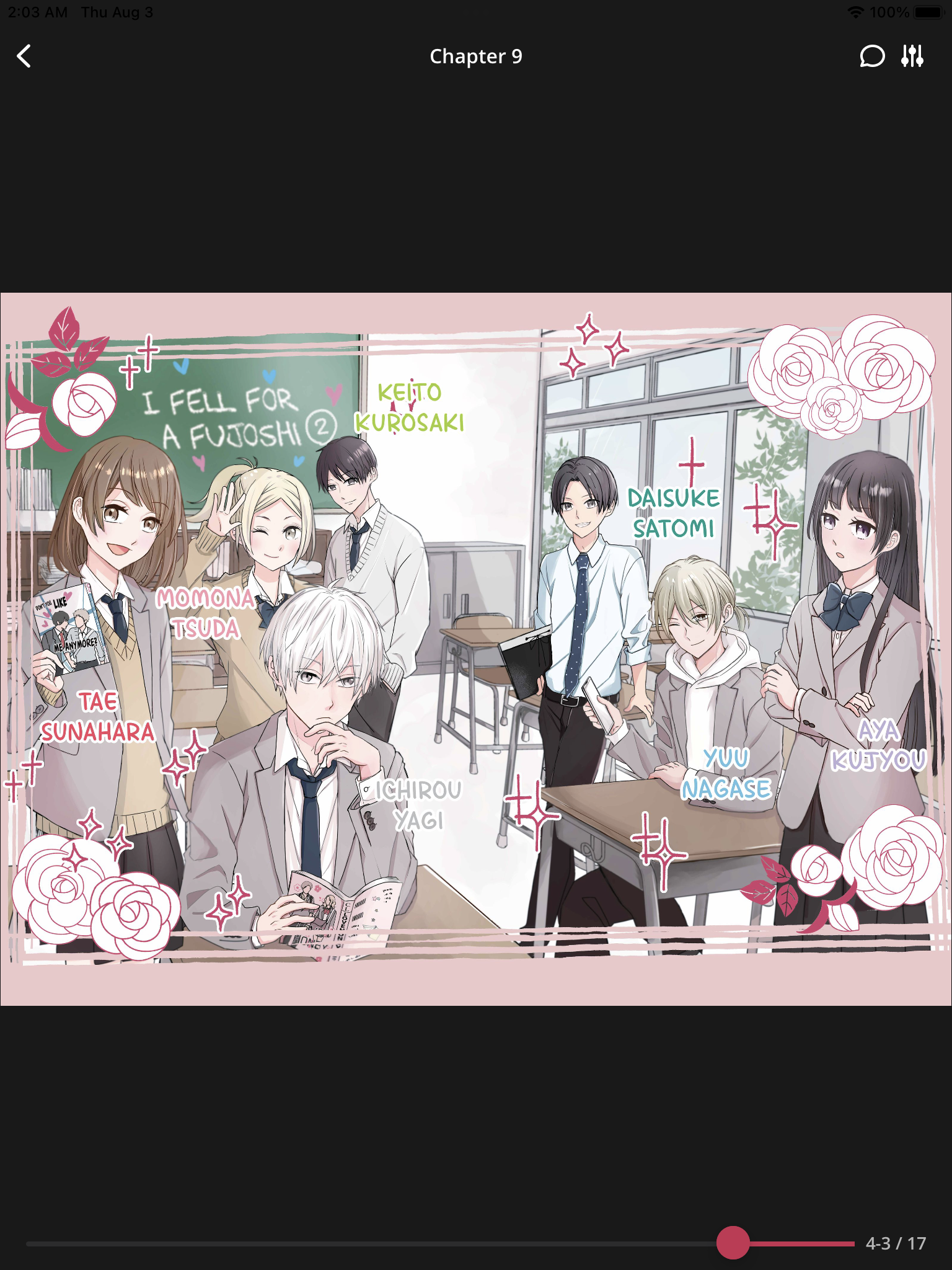
As the primary way of interfacing with a manga series, the reader itself is quite good. The main configuration is the option to read one page at a time, two pages at a time, or scrolling vertically. Rotating the app doesn't automatically change between one and two pages at a time, which allows for the niche use case of reading two pages in portrait mode or a single page in landscape. Two page spreads are always shown together regardless of the reading format you choose, and I haven't seen any data quality issues with spreads being missed or page parity being wrong. You can advance pages with either a mouse click or a tap of the arrow key on their web reader, and with a swipe or tap on their mobile reader. Premium subscribers can download chapters in the app, allowing offline reading.
The experience outside of the actual reader is quite good, too. Azuki keeps track of how far you've read in each series and puts a one-click resume on the front page and the series page. Plus, all series progress is saved to your account, so you can easily switch between the apps and the website without needing to remember where you were. Every chapter also has a comments section, but even the most popular series only seem to have a few comments per chapter at most. One feature that I greatly appreciate is that every series has localization credits, assuming the publisher provides that information. Everything from Azuki, Kodansha, and Kaiten is credited, but some of the series from other publishers simply list a translation agency.

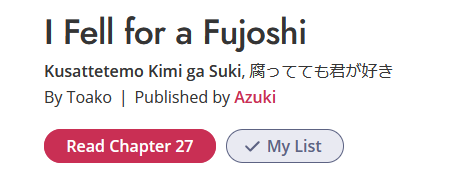
One oddity of the service is their release schedule. Most ongoing series from Azuki, J-Novel Club, and a few other publishers release new chapters weekly. However, the J-Novel Club series are available on the JNC website as well as on services like Kindle and Kobo where individual volumes beyond what are on Azuki can be purchased. Similarly, "A Side Character's Love Story" has been available on Kindle Unlimited for years, with 19 volumes out now, but Azuki only made the first three volumes available on their service last year with one chapter being released per week since. It's a pretty savvy model, forcing users to keep coming back week after week, but when many volumes worth of chapters are already available on competing services it's hard not to feel like you're getting a worse deal.
The Kodansha Problem
As you probably noticed, a lot of my description of the service has exceptions for Kodansha series, and that's worth digging deeper into. When Azuki first launched, they relied pretty heavily on Kodansha simulpubs and Kodansha's digital back catalog as a means to get subscribers. However, last year, Azuki announced that Kodansha simulpubs would no longer be available on the site. All that remained was Kodansha's streaming back catalog, which only contains the first few volumes of several series, which are already available on other services like Kindle Unlimited. Not long after, Kodansha announced their own simulpub manga app called K Manga, and it's not hard to see why Kodansha might've pulled the plug. With Azuki now being a direct competitor of K Manga, losing access to Kodansha's simulpub library was inevitable.
To Azuki's credit, just a few months later, they were able to announce new partnerships with Media Do International and MediBang with plans to add over 150 new series, and more recently, they started offering pay-per-volume sales of the Kodansha back catalog manga, but this mirrors a problem that we've been seeing in the movie streaming world. Netflix used to be the undisputed leader of streaming, but with Disney, Paramount, Warner Brothers, and NBCUniversal all making their own first party streaming services, Netflix is no longer a one-stop shop for every movie. The streaming wars are far from decided, so it's hard to use them to divine what might happen to the manga streaming world, but smaller publishers like Azuki are going to have to be able to adapt quickly. Losing Kodansha doesn't seem to have been a death blow, but who knows what the future holds for them. Azuki is too small to get away with only offering series they've licensed themselves, so at least for now they're beholden to the whims of their publishing partners.
In conclusion
Azuki's straightforward $5/month pricing combined with a competent web and app experience make it a solid deal. If a series you're interested in is on Azuki and you're okay with not owning it in perpetuity and their weekly release schedule, getting a subscription makes a lot of sense. With several new series being added every month, you'll definitely be able to find something to keep you interested. I'm fairly confident that in the short and medium term Azuki will continue to improve their service, but it remains to be seen if $5/month for unlimited manga is a sustainable business model or if users will be left hanging when the money runs out or when their partners pull out to do their own thing.
Questions or comments? Tweet us at @fansubbing! You can also follow us for updates on the latest articles, too.

